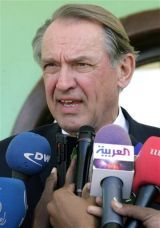UN envoy says fresh fighting in Darfur sets back peace talk hopes
January 18, 2008 (JUBA) — The United Nations envoy to Sudan, Jan Eliasson, said Friday fresh fighting in the war-torn region of Darfur has set back hopes for a speedy resumption of peace talks.

Eliasson and African Union envoy Salim Ahmed Salim are on a visit to Sudan aimed at restarting the peace process after talks in Libya failed in October.
The two said they have been unable to meet with representatives of the rebel Justice and Equality Movement, which has claimed several attacks in recent months.
“Right now, we have trouble getting factions together (and) JEM has intensified military action,” Eliasson said.
Asked about the timing of a resumption of talks, Salim said, “The current circumstances make a schedule impossible.”
The two envoys also warned against tensions between Sudan and neighboring Chad, with each side accusing the other of seeking to destabilize their already tense border region. Khartoum also accuses Chad of supporting the JEM.
“No one can gain from the escalation of tensions,” Salim said.
Efforts to broker peace in Darfur have repeatedly stumbled.
A peace deal was signed with the Khartoum government in the Nigerian capital of Abuja in May 2006 but only one rebel faction endorsed it, sparking deep divisions and a new surge in violence.
The rebel groups have since splintered into dozens of factions and the violence continues.
U.N.- and A.U.-mediated talks in Libya in October, aimed at convincing key rebel leaders to join peace negotiations, quickly collapsed after the main rebel groups boycotted the event.
At least 200,000 people have died from war, famine and disease in Darfur and more than two million have fled their homes since rebels took up arms against Khartoum in 2003, complaining of the region’s political and economic marginalization, according to the U.N.
(AFP)
